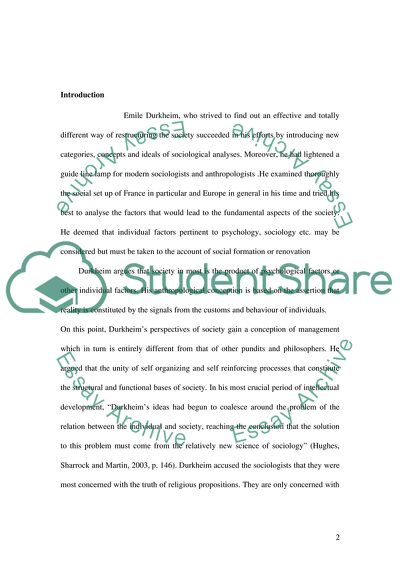
- Home
- Free Samples
- Premium Essays
- Editing Services
- Extra Tools
- Essay Writing Help
- About Us
- Studentshare
- Subjects
- Miscellaneous
- Management in Society - Durkheim
Management in Society - Durkheim - Essay Example

- Subject: Miscellaneous
- Type: Essay
- Level: Undergraduate
- Pages: 4 (1000 words)
- Downloads: 0
- Author: pquitzon
Extract of sample "Management in Society - Durkheim"
may be considered but must be taken to the account of social formation or renovation Durkheim argues that society in most is the product of psychological factors or other individual factors. His anthropological conception is based on the assertion that reality is constituted by the signals from the customs and behaviour of individuals. On this point, Durkheim’s perspectives of society gain a conception of management which in turn is entirely different from that of other pundits and philosophers.
He argued that the unity of self organizing and self reinforcing processes that constitute the structural and functional bases of society. In his most crucial period of intellectual development, “Durkheim’s ideas had begun to coalesce around the problem of the relation between the individual and society, reaching the conclusion that the solution to this problem must come from the relatively new science of sociology” (Hughes, Sharrock and Martin, 2003, p. 146). Durkheim accused the sociologists that they were most concerned with the truth of religious propositions.
They are only concerned with the functions and religions in the society. He reminded that the religion is not a feature or individual behaviour but an essential dimension of collective life. The broad range of norms and formatives set the legitimate goals and activities of the society, he explained. Customs do exist because they contribute to the reproduction and integration of society. Durkheim saw an insider/outsider dichotomy in the organisation of society as a “society is essentially defined on the basis of membership, that is, on the distinction between those who are within it and those who are outside it..” (Hughes, Sharrock, and Martin, 2003, p. 153). It means that Durkheim considered the social stratifications are predominantly based on prevailing conception of morality.
Here, it is important to notice that the Durkheim’s conception of “society as a moral phenomenon stands
...Download file to see next pages Read MoreCHECK THESE SAMPLES OF Management in Society - Durkheim
A Look into the Sociological Works of Marx, Durkheim & Weber
Sociological Positivism and the Criminal Behaviour
Emile Durkheim and His Perspective on Rituals
Labelling as a Primary Source of Deviance: A View from the Three Major Perspectives
Labor Unions Using the Principles of Karl Marx
The Works of Weber, Durkheim, and Marx
Various Concepts of Criminology
Social Theory and Australian Policies

- TERMS & CONDITIONS
- PRIVACY POLICY
- COOKIES POLICY